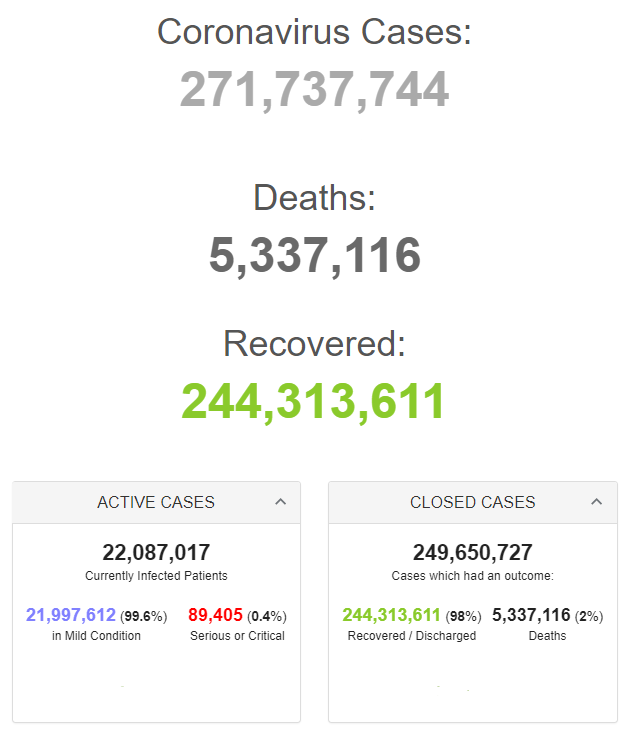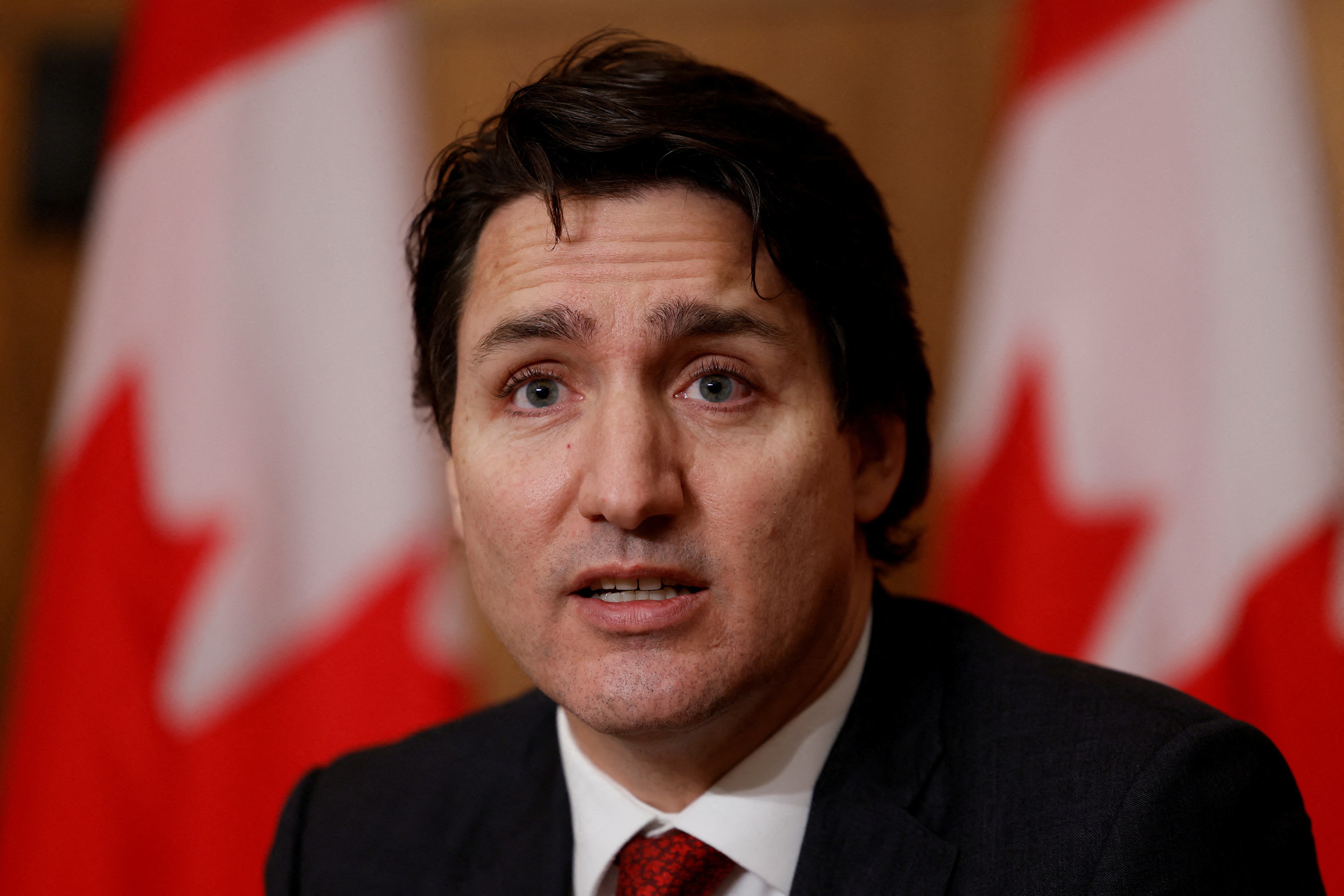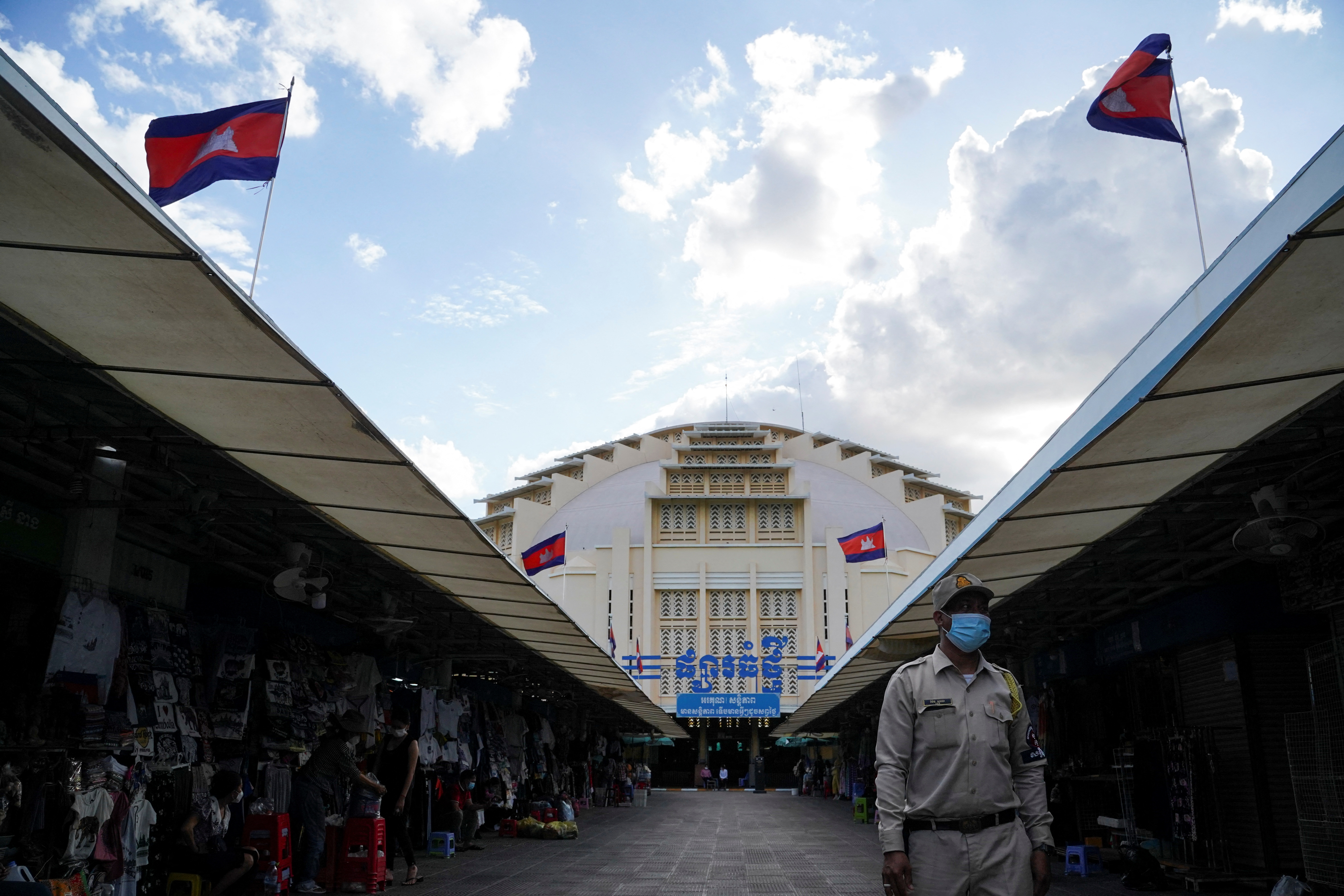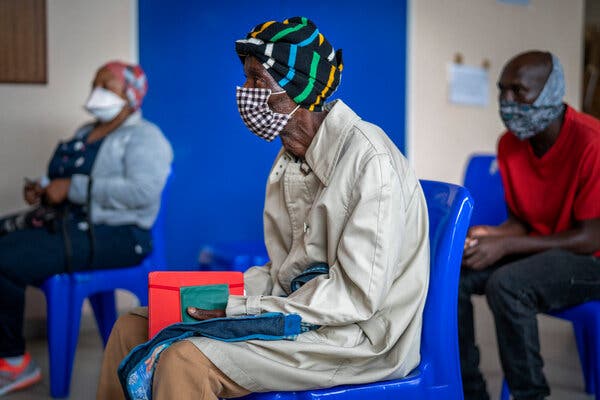
 i_need_contribute
i_need_contribute



Retrieved from: https://www.worldometers.info/coronavirus/

Canada's Prime Minister Justin Trudeau takes part in a news conference in Ottawa, Ontario, Canada December 13, 2021. REUTERS/Blair Gable/File Photo
Canada's Liberal Prime Minister Justin Trudeau was expected to speak by phone to the premiers of the country's 10 provinces on Tuesday to discuss the rapidly spreading Omicron variant of the coronavirus, his office said.
The call was set to take place at 6 pm ET (2300 GMT), according to a provincial source, who requested anonymity.
Deputy Prime Minister Chrystia Freeland told reporters that Ottawa would act quickly and do what was necessary but gave no details.
Separately, the government leader in the House of Commons, Mark Holland, said Liberals would reduce their numbers in parliament starting on Wednesday because of the Omicron variant. He said he had urged the opposition parties to do the same.
The House is sitting until Friday and then will break until Jan 31.
Canada has already announced a ban on people who recently traveled to 10 countries in Africa.
Omicron, which health officials say is more contagious than the currently dominant Delta variant, has started spreading locally within communities in Canada since being first detected in November.
Ontario, the most populous of the 10 provinces, has paused plans to remove pandemic-related curbs and asked staff to continue working from home. It announced measures on Tuesday to protect those living in long-term care and retirement homes.
"Data suggests that each Omicron case is infecting four to eight times more individuals than the Delta variant, and it is rapidly becoming the dominant strain in Ontario," Chief Medical Officer Kieran Moore told a briefing.
Neighboring Quebec is recruiting more people to give vaccinations as it ramps up distribution of booster shots, health minister Christian Dube told reporters.
Sun Life Financial (SLF.TO) paused its office re-opening plan for more employees until the end of January due to worries about Omicron, the Toronto-based insurer said on Tuesday. That followed a similar move by Canada's third-largest lender, Bank of Nova Scotia, on Monday.
Retrieved from: https://www.reuters.com/world/americas/trudeau-speak-canadas-premiers-about-omicron-variant-source-2021-12-14/
By Bart H. Meijer

Pupils sitting behind partition boards made of plexiglass attend a class at a primary school, during the coronavirus disease (COVID-19) outbreak, in Den Bosch, Netherlands, May 8, 2020. REUTERS/Piroschka van de Wouw
The Netherlands will extend COVID-19 restrictions through the Christmas holidays, including the early closure of schools, Dutch Prime Minister Mark Rutte said on Tuesday.
The rapid spread of the Omicron variant of the coronavirus, which is making up roughly 1% of new infections in the country, "is a reason to be concerned and to be cautious," Rutte said in a televised comments.
Elementary schools will close a week early to try to prevent children from infecting older family members during Christmas as hospitals struggle with a wave of COVID-19 patients.
Rutte said a second Christmas "during which grandparents couldn't hug their grandkids under the tree" was a painful necessity.
Booster vaccine shots to improve immunity against the Omicron variant will be offered to all Dutch adults before the end of January, Health Minister Hugo de Jonge said.
Other restrictions in place since Nov. 28, including the closing of restaurants, bars, non-essential stores and other public places from 5 p.m. to 5 a.m., the barring of all spectators from sporting events, and advice to work from home as much as possible were extended through Jan. 14. read more
Infections in the country of 17.5 million have dropped from record levels following the introduction of the nighttime lockdown, but remain relatively high at around 85 per 100,000 inhabitants.
The number of COVID-19 patients in hospitals has remained among the highest levels of the year and hospitals throughout the country have been ordered to postpone all non-emergency operations for weeks to free up beds in intensive care units.
As infections remain highest among young children, experts had advised the government to close schools a week earlier.
The Netherlands has registered almost 2.9 million coronavirus infections, with 20,214 related deaths.
Retrieved from: https://www.reuters.com/world/europe/dutch-consider-early-christmas-break-schools-limit-covid-19-spread-2021-12-14/

A guard walks past empty stalls at Central Market, during the coronavirus disease (COVID-19) outbreak, in Phnom Penh, Cambodia, August 12, 2021. REUTERS/Cindy Liu
Cambodia has detected the country's first case of the Omicron variant of the coronavirus in a local woman who had travelled from Ghana, the ministry of health said.
The 23-year old woman had returned from Ghana via Dubai and Bangkok, the ministry said in a statement issued on Tuesday.
The woman, who was 15 weeks pregnant, had been admitted to hospital for treatment, it said.
The Omicron variant first detected in South Africa and Hong Kong last month has now been reported by over 70 countries and is probably present in most worldwide, but should not be dismissed as "mild", the World Health Organization (WHO) said on Tuesday.
The Southeast Asian nation reopened its borders last month to vaccinated tourists after achieving one of Asia's highest COVID-19 vaccination rates, with more than 88% of its 16 million people now inoculated.
Retrieved from: https://www.reuters.com/world/asia-pacific/cambodia-detects-first-case-omicron-coronavirus-variant-2021-12-15/
By Lynsey Chutel

People waiting for Covid vaccinations at Chris Hani Baragwanath Hospital in Soweto, South Africa, on Monday.Credit...Jerome Delay/Associated Press
The Delta and Omicron variants are driving the fastest surge of new coronavirus cases in Africa since the pandemic began, the World Health Organization said on Tuesday.
The W.H.O.’s Africa region, which excludes Egypt and six other nations in the continent’s north and northeast, recorded about 196,000 new cases last week, nearly double the figure from the week before, the agency said. Most were reported in southern Africa, led by South Africa.
Reported Covid deaths in the region have not increased at the same rate, at least not yet, the agency said.
“We are cautiously optimistic that deaths and severe illness will remain low in the current wave,” said Dr. Matshidiso Moeti, the W.H.O.’s regional director for the Africa region. “But slow vaccine rollout in Africa means both will be much higher than they should be.”
Fourteen African countries and territories have reported detecting the Omicron variant since November, including a cluster of six large nations in southern Africa and a scattering elsewhere: Senegal, Sierra Leone, Nigeria and Ghana in West Africa, Uganda in East Africa, Tunisia in the north, and Mauritius and Réunion in the Indian Ocean.
The Africa region accounts for about one-third of the 2,700 confirmed Omicron cases detected around the world, the W.H.O. said. The region has yet to record any deaths from the Omicron variant, said Dr. Nicksy Gumede-Moeletsi, a regional virologist for the agency.
Much of what is known so far about Omicron in Africa comes from South Africa, a country that is an outlier in several ways. Nearly 26 percent of its population is fully vaccinated, far higher than the regional average of 6 percent, according to the W.H.O. And fully vaccinated people are more likely than others to be tested for the variant, because of travel or workplace requirements, officials said. That makes it difficult to use the data from South Africa as a basis for projecting how the new variant will behave elsewhere in the region.
Most of the 47 countries that work with the W.H.O.’s African regional office have not experienced the major surges in cases and deaths that have afflicted other parts of the world over the past year and a half, said Dr. Thierno Balde, the W.H.O.’s regional Covid-19 incident manager, but Omicron may be different.
“We might see a kind of changing in the number of cases,” Dr. Balde said.
Dr. Moeti warned that as new variants like Omicron begin to circulate, “vaccine-deprived regions like Africa will be especially vulnerable.”
The W.H.O. hoped to have all countries vaccinate at least 10 percent of their populations by September, but most African countries missed that target. Only six are likely to reach the year-end goal of 40 percent. And at the current pace, the W.H.O. estimates that the region as a whole will not get to 70 percent — a level already achieved in dozens of higher-income nations — until the autumn of 2024.
The W.H.O. has called for wealthy countries to hold off administering booster shots for now, so that more doses can be available for initial vaccinations in Africa and elsewhere. But several African nations, including South Africa and Eswatini, have themselves begun administering booster shots.
Dr. Moeti said the extra shots may be “justified” in countries like South Africa, which has been the epicenter of the coronavirus pandemic in Africa, and where there is also a high prevalence of H.I.V.
By Carl Zimmer and Rebecca Robbins
Pfizer announced on Tuesday that its Covid pill was found to stave off severe disease in a key clinical trial and that it is likely to work against the highly mutated Omicron variant of the virus. The results underscore the promise of the treatment, which health officials and doctors are counting on, to ease the burden on hospitals as the United States braces for a mounting fourth wave of the pandemic.
If the Food and Drug Administration authorizes the drug, which could happen within days, then patients might begin receiving it by the end of the year. Although supply will be limited at first, public health experts are hopeful that the pills might curb the worst outcomes from the disease, no matter the variant.
Pfizer said its antiviral pill was found to reduce the risk of hospitalization and death by 88 percent when given to unvaccinated people at high risk of severe Covid within five days of the onset of symptoms. The company also said that laboratory experiments indicated that the drug will attack a key protein in the Omicron variant, which is surging in South Africa and Europe and is expected to dominate U.S. cases in the weeks ahead.
“This is quite amazing and potentially transformative,” said Sara Cherry, a virologist at the Perelman School of Medicine at the University of Pennsylvania who was not involved in the study. “If we could keep people out of hospitals, that would have a huge impact on health care.”
Last month, Pfizer asked the Food and Drug Administration to authorize the treatment, known as Paxlovid, for high-risk adults, based on a preliminary batch of data. The new results will undoubtedly strengthen the company’s application for the drug, which is meant to be prescribed by a health care provider after a positive virus test and taken at home.
The results, based on an analysis of more than 2,200 unvaccinated volunteers at high risk of severe disease, largely match the company’s initial, smaller analysis of the clinical trial, released last month.
Pfizer’s treatment is meant to be taken as 30 pills over five days. Patients will take three pills at a time: two of Pfizer’s new drugs, called nirmatrelvir, and one of the low-dose H.I.V. drug known as ritonavir, which helps Pfizer’s drug remain active in the body longer.
There are logistical obstacles that could limit the Pfizer treatment’s promise, experts cautioned. To receive the pills, patients are expected to need a positive coronavirus test and a prescription from a health care provider, all within five days after developing symptoms. Those challenges could be especially pronounced among the people most vulnerable to becoming severely ill from Covid.
The federal government has ordered enough of Pfizer’s pills to cover 10 million people, at a cost of about $530 per patient. Pfizer will have about 180,000 treatment courses ready by the time it receives its expected authorization this month, but some of those will most likely go to countries other than the United States. The company is expected to deliver only enough of its pills to cover 300,000 Americans before the end of February, and then sharply increase the pace of its deliveries.
Retrieved from: https://www.nytimes.com/live/2021/12/14/world/covid-omicron-vaccines/pfizer-covid-pill-paxlovid
Here’s a round-up of the day’s leading Covid stories:
· Almost 100 Conservative lawmakers voted against new coronavirus restrictions, dealing a major blow to British prime minister Boris Johnson’s authority and raising questions about his leadership.
· Australia reopened borders to vaccinated skilled migrants and foreign students after a near two-year ban on entry.
· New Zealand has fully vaccinated 90% of its eligible population, prime minister Jacinda Ardern announced. Auckland also reopened its border.
· Italy extended a Covid-19 state of emergency to March 31 and ruled that all visitors from EU countries must take a test before departure.
· South Korea reported its highest daily total of cases, as breakthrough infections among those already vaccinated continue to spike.
· Cambodia detected its first case of the Omicron variant in a local woman who had travelled from Ghana.
· The Philippines also detected two imported cases of Omicron.
· Rwanda confirmed six cases of the Omicron variant of coronavirus, the health ministry said.
· Low vaccination rates in regions including Africa – where Omicron was first detected and which has recorded a massive rise in cases over the past week – would provide breeding grounds for new variants, the World Health Organizationwarned.
· Africa is experiencing its fastest surge in cases this year, with the number up 83% in the past week, although deaths remain low, the WHO said.
· Canada is expected to toughen restrictions on international travel with new measures to be announced on Wednesday, CBC News reported.
· Pfizer-BioNTech’s vaccine has been less effective in South Africa at keeping infected people out of hospital since the Omicron variant emerged last month, a study showed.
· All three US-authorised vaccines appear to be significantly less protective against Omicron in laboratory testing, but a booster dose likely restores most of the protection, a study showed.
· Pfizer’s antiviral Covid-19 pill showed near 90% efficacy in preventing hospitalisations and deaths in high-risk patients, and recent lab data suggests the drug retains its effectiveness against Omicron.
· The US surpassed 50 million coronavirus cases, according to Johns Hopkins University data.
Retrieved from: https://www.theguardian.com/world/live/2021/dec/15/covid-news-live-omicron-probably-present-in-most-countries-us-death-toll-passes-800000